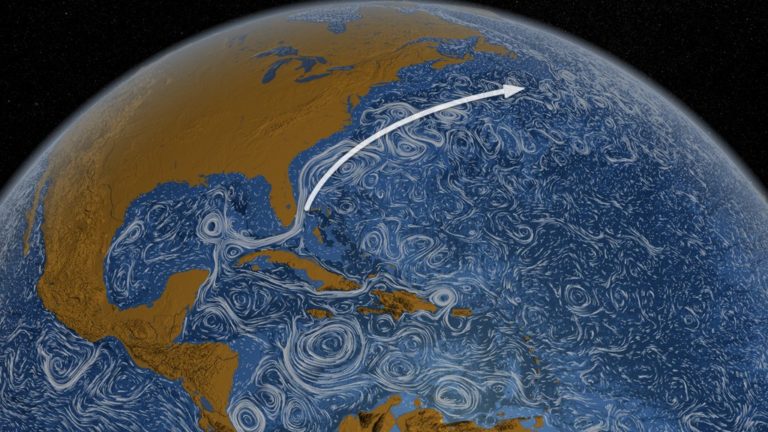Unveiling the Gulf Stream: A Lifeline of Climate Stability
An important factor in controlling the Earth's climate is the Gulf Stream, a strong warm water stream that rises from the Gulf of Mexico. Its transatlantic voyage affects biodiversity, weather patterns, and even human livelihoods.
The Birth of the Gulf Stream
The meeting of the warmer waters from the Gulf of Mexico and the colder waters from the Atlantic Ocean gives rise to the Gulf Stream. A huge conveyor belt of warm, nutrient-rich currents that travel thousands of miles across the ocean is started by this dynamic interaction.
Navigating Climate Systems: How the Gulf Stream Shapes Weather Patterns
The warm waves transported by the Gulf Stream function as an organic heating mechanism for the ambient air. This phenomena moderates temperatures and supports a variety of habitats, greatly influencing the climate of coastal regions.
Ecological Marvels Along the Gulf Stream: Biodiversity Hotspots
A diverse range of marine organisms is supported by the special habitats that the Gulf Stream generates. These warm currents support a wide variety of animals, from colourful coral reefs to regal whales, making it a globally significant biodiversity hotspot.
The Global Ripple Effect: Impact on Climate Dynamics
Beyond its local environs, the Gulf Stream has a significant impact on patterns of world climate. Its warm waters influence rainfall patterns, ocean currents, and even the frequency of extreme weather events by helping weather systems emerge.
Climate Regulation: Balancing Act of the Gulf Stream
The Gulf Stream's ability to control Earth's climate is one of its most important roles. It assists in preserving a delicate equilibrium in temperature distribution by moving heat from the tropics to higher latitudes, preventing areas from suffering drastic swings in temperature.
Unraveling the Mysteries: Scientific Insights into Gulf Stream Dynamics
In order to unravel its mysteries and comprehend its intricate relationships with the larger climate system, scientists are still researching the Gulf Stream. Modern science and technology developments offer priceless insights into the mechanics underlying this essential marine stream.
Harnessing the Power of Nature: Utilizing Gulf Stream Energy
Apart from its importance for climate, the Gulf Stream has enormous potential as a source of renewable energy. In an effort to provide a sustainable response to the world's expanding energy needs, advances in marine energy technologies aim to capture the kinetic energy of ocean currents.
Challenges and Threats: Safeguarding the Gulf Stream
The Gulf Stream is resilient, but it still faces several obstacles, such as pollution, habitat destruction, and climate change. It will need coordinated action to reduce human impacts and maintain the integrity of marine ecosystems in order to protect this essential lifeline.
Adapting to Change: Resilience in the Face of Climate Variability
The relevance of the Gulf Stream becomes increasingly more crucial as climate change picks up speed. Resilience-building and climate adaptation are critical to reducing the possible effects of disturbances to this important ocean stream.
The Future of Climate Stability: Embracing Sustainable Solutions
Protecting the Gulf Stream is essential for preserving climate stability and guaranteeing the welfare of future generations in an era of unparalleled environmental change. To protect this natural treasure, adopting sustainable methods and promoting global collaboration are essential.
FAQs
How does the Gulf Stream impact weather patterns?
By bringing warm waters across the Atlantic Ocean, the Gulf Stream impacts atmospheric circulation and temperature distribution, which in turn affects weather patterns.
What role does the Gulf Stream play in biodiversity?
The Gulf Stream is a globally significant hotspot for biodiversity because it provides distinct habitats that are home to a wide variety of marine organisms.
Is the Gulf Stream vulnerable to climate change?
Indeed, rising sea temperatures, ocean acidity, and changes in ocean currents are some of the concerns that climate change poses to the Gulf Stream.
Can the Gulf Stream be harnessed for renewable energy?
Indeed, the possibility of using the kinetic energy of ocean currents, such as the Gulf Stream, as a sustainable energy source is being investigated by advances in marine energy technologies.
How can we protect the Gulf Stream?
Working together to combat climate change, cut pollution, and support conservation measures that protect marine ecosystems is necessary to protect the Gulf Stream.
What are the implications of disruptions to the Gulf Stream?
Wide-ranging effects of Gulf Stream disruptions may include modified weather patterns, alterations to marine biodiversity, and effects on the stability of the global climate.
Conclusion
In conclusion, comprehending the significance of the Gulf Stream for climate is critical to appreciating the complex dynamics of the weather systems on our globe. Maintaining the integrity of this essential marine current is crucial to ensuring future generations can live in a sustainable manner as we negotiate the challenges posed by climate change.
 Geetesh
Geetesh


